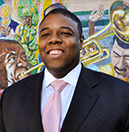We all have a story to tell. But until recently, only a privileged few had the power and the platform to share people’s stories. They not only decided whose stories were told but how. Today, affordable technology and the rise of social media have democratized the communications landscape—and changed the rules. Today, the people have the power.
In the past, poor and marginalized communities had no means of controlling how their stories were framed and shared. When their stories were finally told through their voice and perspective, there was little choice but to comport tone, message, and delivery to fit the needs and worldview of gatekeeping media conglomerates. Today, technology has unlocked the gate and placed the power of storytelling in the hands of the people to share their untold stories and unseen struggles.
As an organization keen on delivering unfiltered messages, the Winston-Salem Urban League began producing news clips and casting them on YouTube, Twitter, Instagram, and Facebook Live. We used the clips to promote our programs, activities, and events, and garnered tens of thousands of views. The high number of people who comment and inquire about our professional looking videos is proof that you do not need expensive equipment to produce high quality content. A little elbow grease, a $150 studio lighting kit, an empty office, a smartphone camera and free video editing software goes a long way.
Social media also allows us to deliver our messages immediately and directly to our community. Two summers ago, when deadly interactions between police and Black Americans stunned the nation, the teens in our Summer Youth Employment Program worked with our staff to produce a 10-minute video called “Ten Tips For Teens When Dealing With Police.” The video, advising teens on their rights when stopped by the police, was viewed on Facebook more than 8,000 times in over a week. In January 2018, we launched our “Home of My Own, Home Buying Seminar” in partnership with Delta Sigma Theta with a three-minute news style video shared on Twitter, Facebook and Instagram. Our social media promotion strategy boosted registration and the event was sold out in a matter of days.
It did not take us long to recognize that we had an obligation to share this opportunity with our community in a way that empowered their own voices. This year, we will transform a drab space in our computer lab into a hub of community-driven creativity. Members will have access to video equipment, studio lights, backdrops, video editing software, high-quality microphones, and courses on videography and podcasting.
With a little ingenuity, affordable technology, social media, and the leadership of the Urban League, members of our community will have the power to control how their stories are told.



